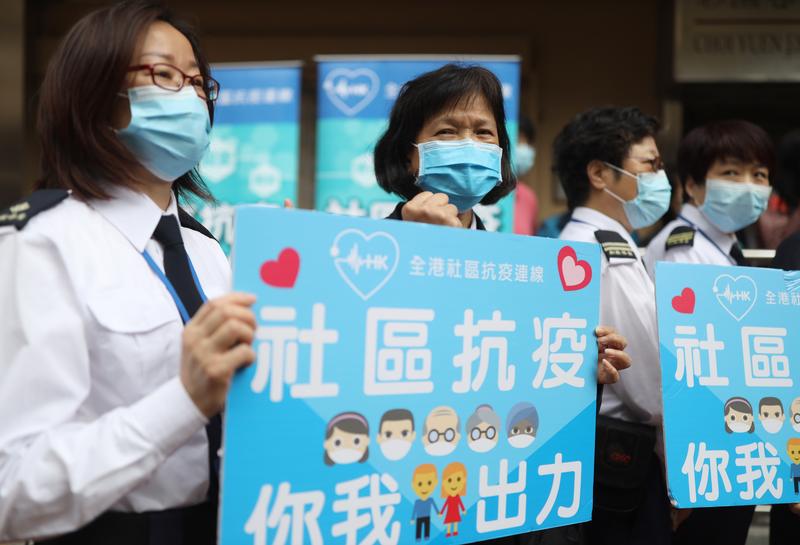 Security guards hold placards saying “We fight the coronavirus together” during a free face mask distribution event, conducted by the Hong Kong Community Anti-Coronavirus Link on Sunday in Sham Shui Po. (EDMOND TANG / CHINA DAILY)
Security guards hold placards saying “We fight the coronavirus together” during a free face mask distribution event, conducted by the Hong Kong Community Anti-Coronavirus Link on Sunday in Sham Shui Po. (EDMOND TANG / CHINA DAILY)
Medical experts in Hong Kong are suggesting changes to the city’s current strategy against the novel coronavirus pneumonia epidemic, as they cautioned that the city faces mounting risks of imported cases from foreign countries and a high possibility that the disease might become endemic.
The remarks on Sunday came the same day that the Department of Health confirmed four more cases of the novel coronavirus infection, bringing the city’s tally to 114. Meanwhile, a 76-year-old female patient who had contracted the disease died on Sunday, becoming the city’s third death related to COVID-19.
Yuen Kwok-yung, a leading Hong Kong microbiologist and one of the government advisers on epidemic control, said during a Sunday television interview that it is highly possible that the novel coronavirus pneumonia outbreak won’t end this year.
Yuen said he believes the outbreak will be brought under control only after vaccines or drugs to treat it are available. But he assumes it will take years during which the disease might become endemic in Hong Kong — always present but under control, like the flu.
He noted the current challenge Hong Kong faces is preventing imported cases from foreign countries — not the Chinese mainland. Closing checkpoints will become an increasingly less-important factor in containing local transmission, he added.
Leung Chi-chiu, chairman of the Hong Kong Medical Association Advisory Committee on Communicable Diseases, agreed with Yuen, telling China Daily that globalization has made it easier for foreign cases of the epidemic to be imported.
“It is nearly impossible to cut off all transmission chains in today’s global village,” Leung said.
Leung suggested that Hong Kong now should embark on a “thoughtful” and “comprehensive” plan for a long-term war against the deadly disease.
For example, Leung said, the government should figure out ways to ensure a sufficient supply of anti-epidemic products, as well as work on long-term border-control measures against imported cases.
He also called on all social sectors and individuals in Hong Kong to shoulder their responsibilities in the global war against the disease.
Chuang Shuk-kwan, who heads the Communicable Disease Branch of the Centre for Health Protection of the Department of Health, told a regular news briefing on Sunday that she agreed with Yuen’s view on the contagion in Hong Kong.
Chuang said that the city in the future will need to change its strategy and mindset about the virus if the epidemic won’t end in the short term. One such possible strategy is treating the disease as a “serious flu”.
The Hong Kong government has adopted different measures to prevent imported cases. Since Feb 8, arrivals from the Chinese mainland are immediately put under a 14-day quarantine, while starting from Feb 25, arrivals from South Korea who are not Hong Kong residents were barred from entering the city.
Hong Kong International Airport on Sunday began requiring all arrivals to fill in health declaration forms. Hong Kong also issued red warnings for outbound travel to Iran, South Korea and three regions of Italy.


